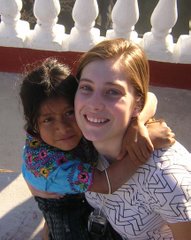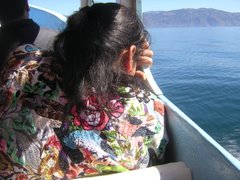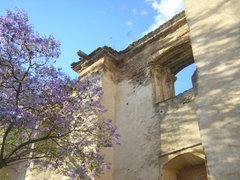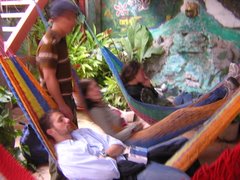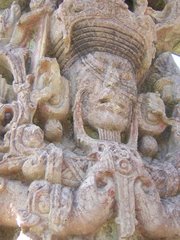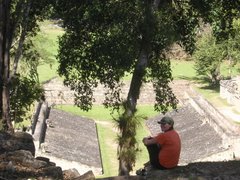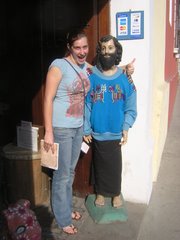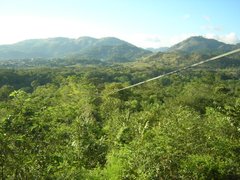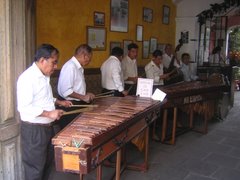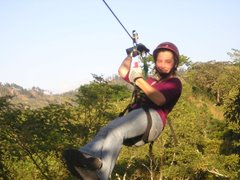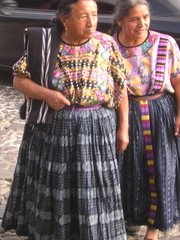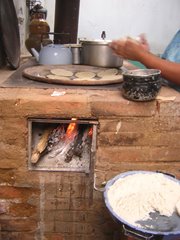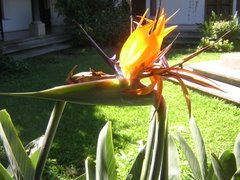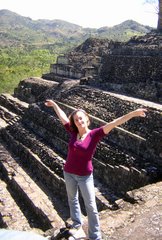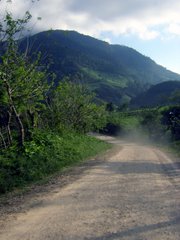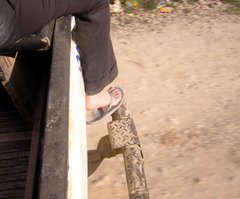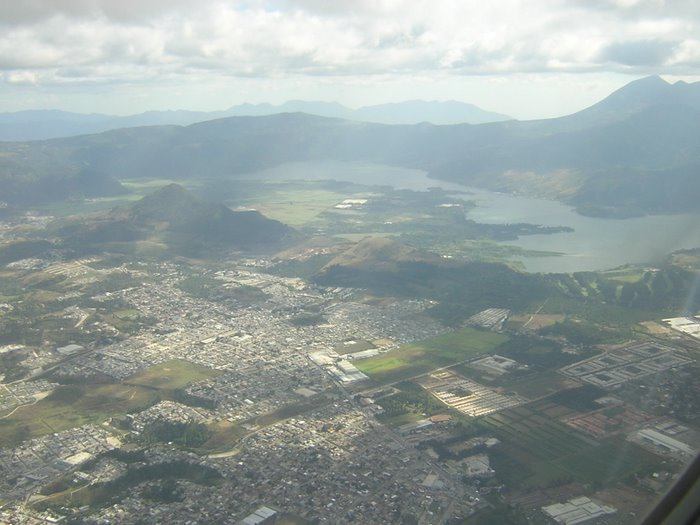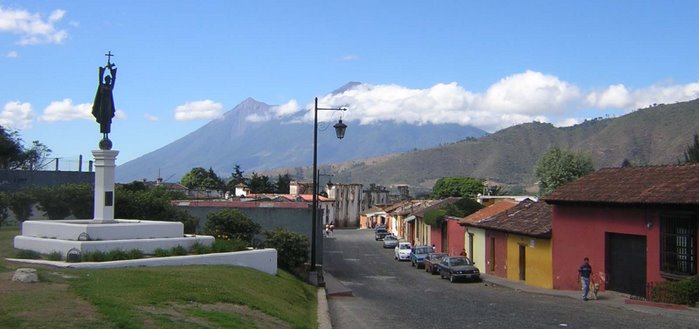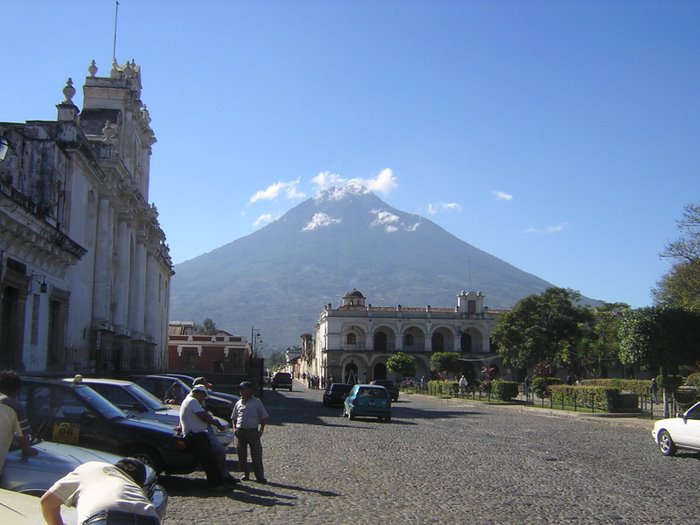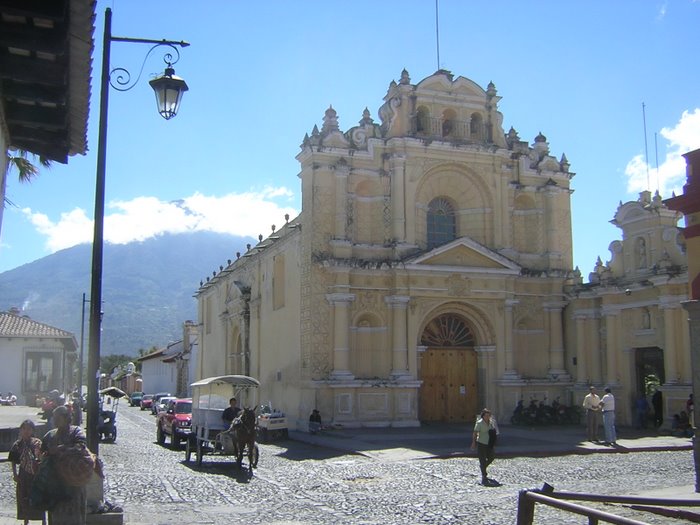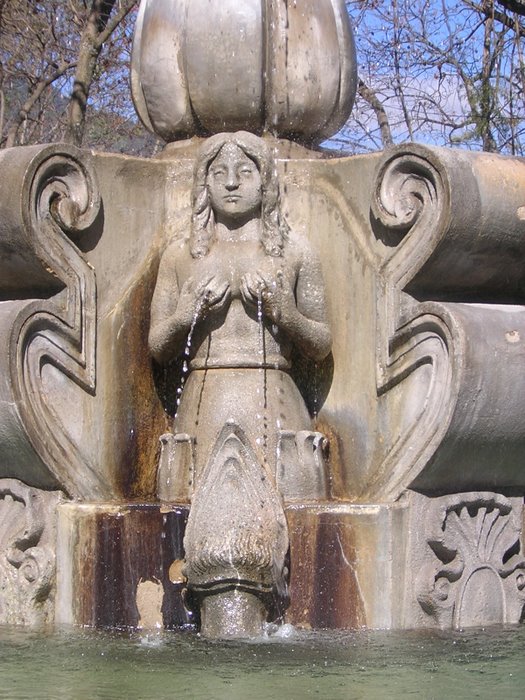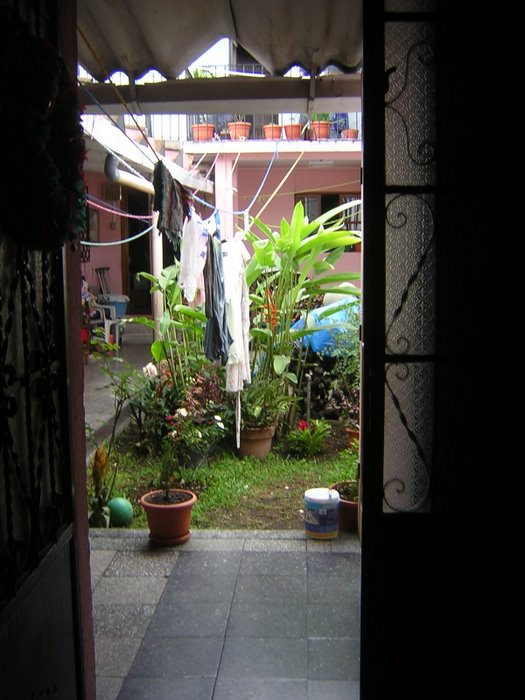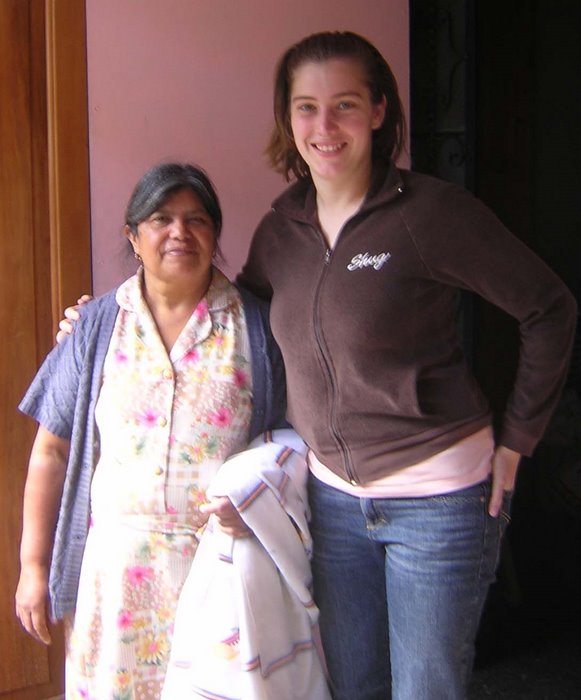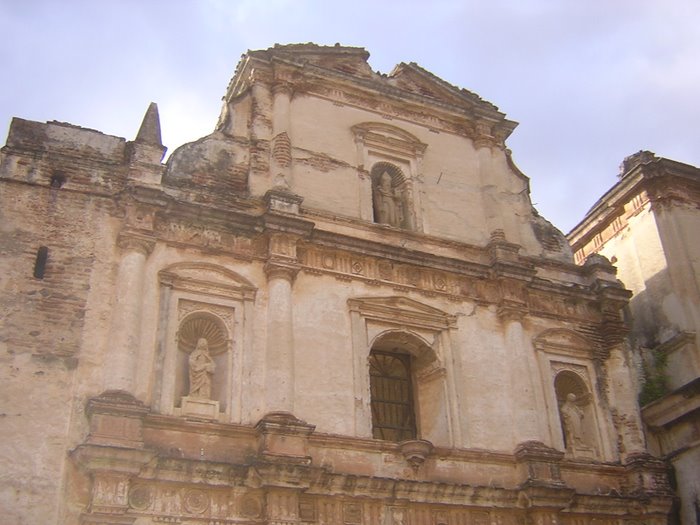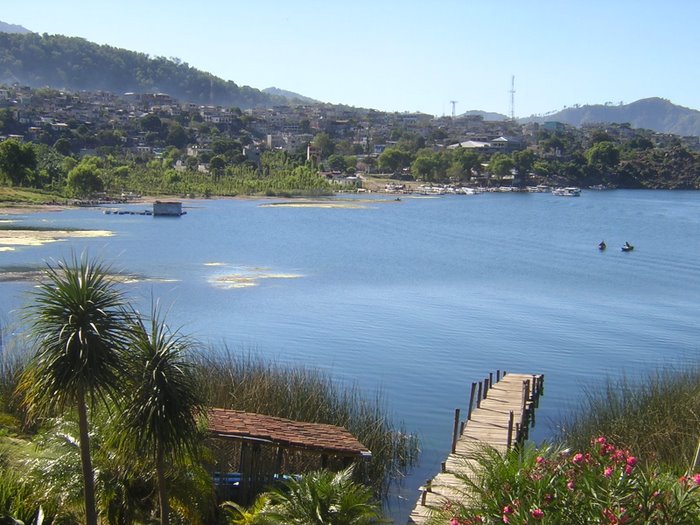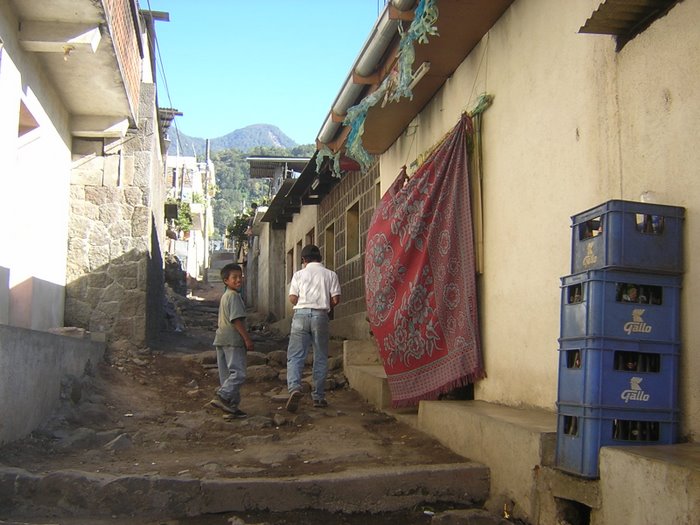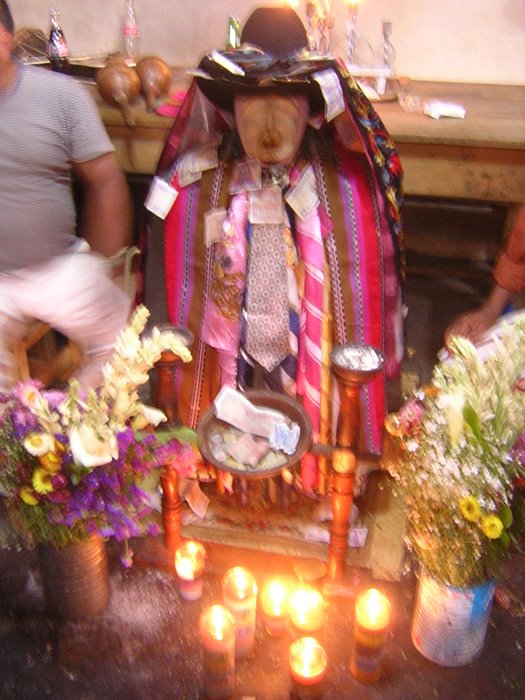I can sum up the past four weeks in ten words: Danny visited(!),
El Salvador,
Tikal, Semana Santa processions, Iximche’, and Quetzaltenango. But of course you have no idea what any of that means, so I will give you one piece at a time.
 Piece #1: Danny visited me for the holy week of Easter and it was truly magical. We visited El Salvador on a class trip, the Maya site of Tikal on our own and Antigua for the Semana Santa processions, and I want to thank him publicly for such a beautiful and breathtaking week. Here is a photograph that encapsulates the feelings of the week: discovery, enchantment and tenderness. (The photo is from atop Maya ruins at Tikal overlooking Temple IV, which is peeking out of the forest canopy between our feet.)
Piece #1: Danny visited me for the holy week of Easter and it was truly magical. We visited El Salvador on a class trip, the Maya site of Tikal on our own and Antigua for the Semana Santa processions, and I want to thank him publicly for such a beautiful and breathtaking week. Here is a photograph that encapsulates the feelings of the week: discovery, enchantment and tenderness. (The photo is from atop Maya ruins at Tikal overlooking Temple IV, which is peeking out of the forest canopy between our feet.)
Piece #2: When we crossed the border into El Salvador, I found the differences with Guatemala striking. Driving through the green countryside, I first noted the well paved and maintained roads. Plainly the Salvadoran government had at one time spent a good deal of effort and money to develop and maintain clear passageways through the country (more so than the Guatemalan government). However, alongside these well managed highways and underneath large billboard advertisements championing capitalistic ideals were shanty towns of poor squatter communities with nothing more than plastic, wood and garbage for homes. The dichotomy and allocation of resources was arresting. This contradiction sent a clear message: even today, the El Salvadorian government is more interested in being able to manage and oversee its people (through the use of well paved roads allowing easy travel and close tabs on all areas of the country) than to house or feed them.
It was especially intriguing to note the dissenter psyche of the people persevering in the capital city of San Salvador. When our class visited the National University, I was immediately aware of the explosive feel of the campus because of a strike between workers and professors. The campus was littered with trash (as a form of protest by the workers); there was a burnt and painted shell of a car denouncing a particular professor as the culprit for the demonstration, and graffiti was everywhere: on buildings, fountains, monuments and the ground. It seemed that graffiti was an accepted form of expression and forum of opposition. I thought how this sort of student reactionary behavior to an administrative dispute would never take place within the sterile and sheltered universities of the United States. It was fascinating to see the students actively oppose a bureaucratic issue. I noted that this unrest and suspicion of authority is what unites and, in part, defines the young generation of Salvadorians; and rightfully so - they grew up during a bloody and savage civil war.
With our ex-guerilla fighter and marxist professor, we visited the Museo de la Voz y la Imagen, which is dedicated to maintaining the history of the civil war (with no help from the government which has no museum or dedication to the war). Seeing photos of the horrifying massacre in the pueblo of El Mozote was intensely haunting and compelling. Among such disheartening images and histories, I was impressed by the way in which the museum director spoke about the events. She presented the exhibition and repeated one theme over and over: the importance of remembering what happened so that it would not happen again. This hopeful understanding of her purpose within the museum and her duty to the future and past generations of Salvadorians was commanding and I admired her sense of purpose.
What impressed me most was a F.M.L.N. (the political party created from the revolutionary efforts of the 80's) legislative tribunal in the central square of San Salvador. With the National Cathedral looking down upon us, senators from the F.M.L.N. party summarized the past week’s governmental activities and led an open discussion, fielding public commentaries. The hundreds of people who had gathered in the square listened to the demands, approvals, and criticisms of the government, (all made by fellow ordinary citizens) and either applauded or hissed as they saw fit. To me, this was the most impactful experience of El Salvador, because I have never seen any example of representative government truly this direct and from the heart of the people. The senators stood there and listened to the desires of the people they represent without censuring or reviewing what was being said, and truly connected as all of it was broadcasted live on the radio. My feelings were intensified by the nearby presence of the steps of the National Cathedral, where, not twenty years ago, unarmed members of the very same party, the F.M.L.N. were massacred by the government during a peaceful demonstration.
Our final day in El Salvador we rode in the back of a pickup truck and trudged on foot through the rough Guazapa hills to visit the base camp and strong hold for the revolutionaries during the war. As we passed over rotten and weathered old boots, tin cans, and bullet shells – remnants of the fight there – we were guided by an ex-guerilla fighter named Orlando. He cautioned us to stay on the trail, because landmines are still present. Seeing how the fighters lived for the years of the war made me realize just what exactly these men and women gave up to be there. And how much they believed in their fight against the government, in order to make those sacrifices.
Our professor had this to say about our experience, “What you saw was a great achievement for El Salvador: a lot of people died for you to be able to see that F.M.L.N. meeting. A lot blood, tears and sacrifice was given for that meeting to be there. El Salvador isn’t in heaven, but change has happened. Our guide, Orlando, only left the Guazapa Hills once during the 10 year war; once to fight in the capital of San Salvador. He spent his entire life fighting in Suchitoto; he sacrificed his youth. Before, in his time, you never would have been able to go the places you have been, and see the things you have seen, and this in itself is progress.”
Piece #3: Last weekend’s travels included the Maya site of Iximche’ ruins and the second largest city in
Guatemala; colonial Quetzaltenango.
Photos do these experiences better justice:














